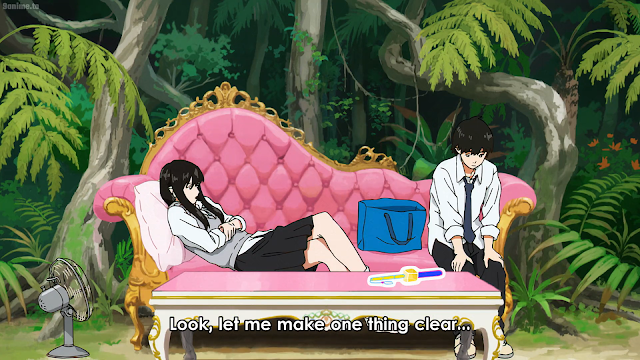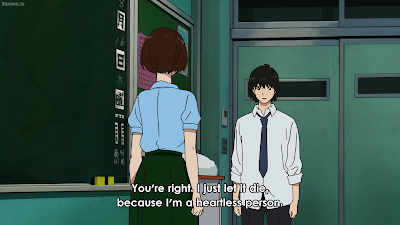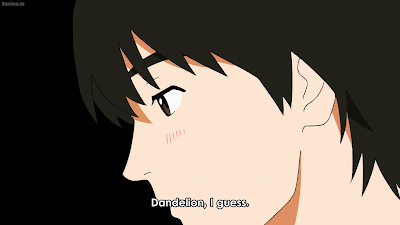Sonny Boy: The Savior and What the Eye See
The Human Sandbox (Episode 1):
https://zxcaderu.blogspot.com/2021/07/sonny-boy-human-sandbox.html
This essay takes an in-depth view on a concept I coined, the 'human sandbox'. It is an analysis focused around how the show's structure and premise removes all sense of survival-concepts and societal associations. This is done so to establish our characters not as human-beings but as a pure manifestation of 'concepts', ideas that the show writers are much more excited to explore.
It is also a lot more technique-based, using interesting techniques like 'cold openings' and 'anti-climax' to enhance its ideas. On the other hand, the essay takes on lesser interpretations of characters and symbolism, so it may not be as interesting to those who prefer the more narrative side of the story.
Integrity and Her Benevolent Sandbox (Episode 2):
https://zxcaderu.blogspot.com/2021/07/sonny-boy-integrity-and-her-benevolent.html
This essay is split into two; The first half focuses on Mizuho and takes a deep-dive into her personality; It jumps between taking a more narrative analysis about her human qualities and also her more symbolic qualities, namely the concept of 'integrity.
The second half continues building on the 'sandbox' idea I have in episode 1 and thus lends it a more structural lens (or more meta lens) on why the writers might be interested with such a strange premise to begin with. For those interested in narrative and just thinks Mizuho is best girl (I don't blame ya), read the first half and ignore the second. For those who likes technical jargons and meta-explorations, you know where to go.
Chapter: Recluse
There is a hierarchy amongst the students; The superhumans and the 'normal'.
We discussed in episode 1 how all the students are pure manifestations of ego and have unlimited potential, but in the subsequent episode that begun to crumble. Students now face powerlessness, loneliness and insecurity; The establishment of the superpower hierarchy has brought about a real-world problem -- Social pressures.
Asakaze is powerful. In fact, he is literally Jesus, being able to split the ocean in half. And yet by his side, many students lack such power, lifting logs by their shoulders and toiling the fields by hand. Mizuho is fortunate. She has everything she can ever want, and in extension, everything that all the other students will ever need. To get even a fraction of that, they need to sweat under the sun and labor away. Even in that superpower spectrum is there its own hierarchy. Powers by its conceptual idea can be ranked based on their utility; A person may be able to shape the fabric of reality and yet the next will only be able to become the human equivalent of the anglerfish.
These elements have brought together a familiar concept; Workplace hierarchy. The ones at the top will have managerial duties like Pony and Cap; They oversee and they demand, just like how Pony chased Mizuho not for answers but for results. On the second tier, those with superpowers make labor obsolete; A guy was pictured sitting down in his shade, terraforming entire trees while the tier 3 students suffered under the hot sun. The factors that used to determine our social rank and aptitude -- Talent, luck, connections -- has now been replaced with something even more absurd in its unfairness, the 'superpowered'.
This world is bias; In fact, the students were shown complaining this episode; When Mizuho showed up at the classroom, some snarkily remarked: "Unlike a certain someone, we don't have the time or any special powers." Just like in the real world, social tension is hurtful, discriminatory and has seeped into even a 'sandbox' of pure ego. How do our students deal with this unfairness? They form cliques.
In their social groups, they find opportunities to relate, to vent, to relax. This is their sanctuary where they can be empowered by numbers of their own and reject the 'powered' of their scorn -- A personal bubble where they themselves have some form of social control.
However what happens when even cliques reject an individual? When the odds are so stacked against your social aptitude that even the lower spectrum disowns you. That is where you will find the true recluses of society; The shut-ins.
"Nobody worries about me. It's so nice being one of the gifted, huh? Getting pushed around by them however they want. I just kept thinking I've had enough of this, and before I knew it, here I was."
Unlike a social-sanctity, this is an isolated-haven, where one don't even need to breath the outside air. These social rejects are in essence, bubble-wrapping themselves from even the slightest pressure of human interaction. To fulfil their own needs, they consulted a variety of hobbies; One desired to maximize his time by improving his body -- A healthier alternative -- But others, not so much. They became chair-bound; One fell victim to his online forums and the other streamed to an imaginary audience. In fact, you can say they relied on that to satisfy their desire for human connection; Instead of putting themselves at risk in a face-to-face interaction, they are protected by anonymity behind their plastic screen. Our last individual even had a coping mechanism, substituting all interactions with naught but unassuming, fluffy faces. It is the perfect chamber; You are safe from all pressures and you can make yourself feel good. It's even addictive, with its low-cost dopamine rushes. Why should one risk social failure when you can get everything you want here?
Is that really true though? Other than the one who likes working out, the rest didn't seem all that happy. When confronted by Nagara, they seemed melancholic, even ashamed of their own escapism. Compare their attitude and environment to that of another social recluse, Mizuho; They are much less confident and much more insecure. Unlike the vibrant castle, their room is literal curtains, shutting themselves from sight and possible judgement. Mizuho is a willing social recluse; She doesn't partake in many human interactions because as 'integrity', she is unwilling to tolerate the farces. The others social recluses are instead scared of those farces, and are trapped by their fear of them.
Believe in Yourself
Nagara isn't so different from a social recluse. Before the drifting, he was accurately judged by Nozomi as someone who is "acting like they have so many places they need to be". The word 'act' tackles the heart of social pressures, the need to 'look adequate'. He is well aware of what these social images are. When confronted by Nozomi on why he didn't save the dying bird in episode 2, he subconsciously projects his insecurities, admitting to being a "heartless person". And it is because he is aware of social images that he compares himself to others; When confronted by Mizuho in episode 3, he reveals his lack of self-esteem -- "There is no way I can beat him (Asakaze)." This is similarly echoed in episode 4, with Ace; We will discuss that further below.
One should take note not to immediately associate comparison with low self-esteem. After all, there can be many cases where we can compare yourselves to others and yet not feel insecure; For example if you are perfectly fine with your body image, you can confidently flaunt the word 'fat' or 'skinny' without feeling as if a part of you is being torn apart. However, it is because Nagara has shown instances of actively shying away from his insecurities do I say that he lacks self-esteem; After all, why else would he be triggered by the direct remarks of Mizuho in episode 3?
However, what makes Nagara different? Why doesn't he escape into the curtains? I think the answer is simple -- Ambition. Nozomi asks him in episode 1: "Are you a sunflower, or a dandelion?" In other words, if there is a place that shone brighter, would you want to go see it, or stay rooted and only stare at it. He replies: "Dandelion, I guess?"
While Nagara doesn't express himself often, his ambition is always hinted by a variety of symbolism. For example, most of us probably know that Nozomi is symbolically represented by birds, but some may have missed Nagara's own bird parallels such as in the very first scene when Nozomi picked a feather off of his face. And in episode 4, he was able to take a swing at the fastball, against all expectations and odds that weighed him down.
The Savior, of Himself
Episode 4 challenges Nagara even further. We should understand that his power is much more special and unique; While the rest of the abilities are like tools, expending energy to conjure power, his ability is instead conjured by conceptions; His 'empathy' allows him to relate to recluses, and warp into their rooms; His 'empathy' allows him to understand the feelings of the monkey umpire, and conjure up his stadium. His grasp on human emotions and concepts drives his power; It is thus in his most imaginative is he the strongest. However the opposite holds true as well; When Nagara is confined by opposing opinions and pressures, his power falters -- Episode 4 shows two sides of this coin.
Nagara understands and empathizes with the monkey umpire and his battle against expectations; I think most of us has even drawn parallels between the two of them, describing their battle for their own forms of 'integrity'. Thus a more interesting discussion I want to bring to the table is how the structure of storytelling bolsters his empathy. I saw a common complaint about the lengthiness of the exposition regarding the monkey fable; Cap, to put it mildly, simply could not shut up, expounding on details that ran close to eight full minutes of exposition. To me however, 'Sonny Boy' -- An anime that flaunts its visual metaphors -- Has for once, 'told' instead of 'show'. Why did the writers not conjure up some weird reasons for us to 'see the concepts' like how it has done so every other time?
It is simple; Just like how empathy requires understanding and imagination, we too, need to practice. It is in the show writers attempt to force us to imagine, does it intentionally pad out the details. Without vivid descriptions, we would have no motivation to 'think'. And moreover, anime nowadays have already conditioned us into 'passive' viewers, one who is spoon-fed with visual and auditory details; Those who have read fiction before would understand how different our mindset is between books and shows; When we see simple black text on whiteness, our brain encourages us to go beyond our 'passive' roles; And it is for this reason why we are given five full minutes of details with minimal reactions or animation; That rambly and monotonous sequence was our black text on whiteness.
The result of that may no doubt vary between the audience; Some may appreciate the vivid descriptions and others may be bored. I, for one, found myself much more invested in the moral dilemma of the monkey umpire. I was given the opportunity to imagine him standing in the midst of the booing crowd, having his collar wrung dry by Blue who berates him in his face. And isn't this the same kind of inspiration that Nagara receives? In understanding the umpire, he imagines his appearance; He contextualizes his struggles; And he conjures up a stadium to quite literally stand in his shoes. To some inception-like effect, the show has allowed us to empathize with Nagara's act of empathy; That is some story-telling creativity that is utterly mind-blowing.
So we have seen the best of what empathy has to offer; But what about the other side of the coin? Just like what happened to the monkey umpire, what happens when your ideas and conceptions are mislead by others?
Nozomi reveals an interesting insight; When Nagara failed to warp, she says: "I can't believe this world we've been in is the one that he would choose."
This reveals Nagara to be the one responsible for conjuring up this summer island. In a broader perspective, this island has thus far been plagued with many rules that he himself dislikes; Namely, a false economy that impedes labor onto students and also a rule that further shuns recluses. But think about the implications of this fact. Why would he conjure up islands that he himself doesn't want?
It is simple; Nagara thus far is still plagued by many real-world conceptions and systems; A capitalistic economy where the gifted thrive and the commoners bear; A society which encourages the recluses to become shut-ins. He has subconsciously projected the real world into this island. That is what happens on the other side of the coin, when your imagination is tainted by social norms. It is for this reason why the world flashed red for a second just before Ace's final pitch; In that split moment, he was fearful and thus lost touch of his imagination. Similarly, it is the reason why his many conjured worlds only could resemble postmodernist art; He has yet to fully understand and grasp what the real world is.
Turns out, I really wasn't that far off when I guessed at this show being a coming-of-age story after all. The direction of the show becomes clearer now; To go back home, Nagara needs to learn how to express himself in the face of societal pressure and also carve out his own beliefs free from such; Only then can he truly reach the place he wants to go -- Nagara is the fated 'Savior', but only after he saves himself.



























Love your interpretation. Been looking for different povs and yours worth-reading. I appreciate it a lot!
ReplyDelete